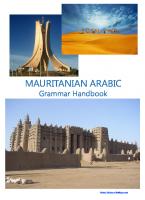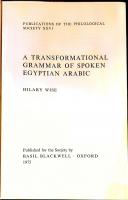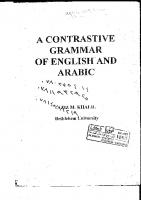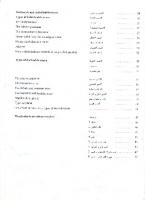Arabic Grammar
634 18 1MB
English Pages [5]
Recommend Papers

- Author / Uploaded
- Speedy Publishing
File loading please wait...
Citation preview
šaraabi) I can’t find one of my socks. - Again, note that “šaraabi” technically means just “my sock,” but it’s understood to mean a pair. Broken plurals
Note: If the singular form ends in a taa marbuuTa
Most Arabic nouns have broken (irregular) plurals. A few examples:
( -a), you need to “untie it” — change it to a — ت before adding the suffix. Take the word (“sentence”) as an example: (gomla) “Untie” the taa marbuuTa (replace it with a )ت:
Note: While you can use the suffix to talk about two people, usually it’s better to say “(itnein) + [plural noun]”:
With these nouns, you simply have to memorize their plural forms until you internalize the broken plural patterns. Eventually, once you’ve memorized enough broken plurals, you’ll start being able to predict the plural forms of new nouns. Adjectives An adjective is a word that describes a noun — “smart,” “pretty,” “good,” etc. Remember that (the active participle) acts as an adjective.
If you want to talk about a pair of things, like socks or shoes, you should use the singular form of the noun, and it’ll be understood that you’re talking about a pair. If you want to talk about one item out of a (farda min), literally “an individual pair, say from.” (laazim ašteri gazma gdiida) I need to buy a new pair of shoes. - Note that although “gazma” technically means “shoe,” it’s understood that you mean a pair of shoes. (ana miš la’ya farda min
(il-film da mumill) This movie is boring.
A good book
(kitaab kwayyis)
(howwa naayim) He is sleeping. (is-sitt illi wa’fa hnaak) the woman who is standing there Some basic adjectives.
Here’s a list of some common, basic adjectives in Egyptian Arabic:
Comparative and Superlative Adjectives Elative forms of adjectives In Arabic, there are elative forms of adjectives that are used for both comparisons (ex. “bigger”) and superlatives (ex. “best”). Elative adjectives are invariable and take three regular forms: (af3al) - this is the most common form. (afa3ll) - corresponds to adjectives with a 3. doubled/geminate root.
There is an irregular comparative:
Adverbs 2. (af3a) - corresponds to adjectives that end in Adverbs of time ( يـ-i) or ( وـ-w).









